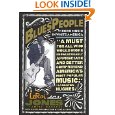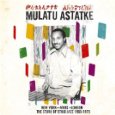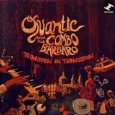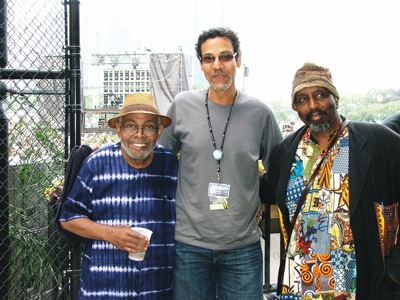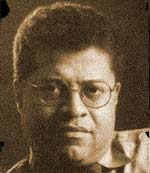
Gene Seymour
Our series of conversations with black music writers discussing their craft, including obstacles and pecularities which may or may not be related to issues of ethnic identity, continues with veteran scribe Gene Seymour. My first opportunities to read the witty Seymour’s prose came during his lengthy tenure as jazz contributor to New York Newsday. He has written for numerous publications, including as columnist for the late African Amerrican magazine Emerge and is the author of the valuable volume Jazz, the Great American Art (pub. Franklin Watts, 1995). Gene Seymour, who also writes about film, is based in Brooklyn.
What motivated you to write about this music when you started?
For as long as I can remember, my imagination has been stimulated more by what I heard than by what I saw, even though my very first ambition was to be a cartoonist. (Another story for another time.) Sound, as opposed to noise, has been my Muse, my joy and, every once in a while, my terror. (Pitched at just the proper angle, the memory of a lone sound of a muted tympany, accompanied by an ominous voice during a radio or recorded fairy tale could keep me awake all night.) Living in a four-room housing project apartment, it was easy for all manner of sound to seep into my bedroom, even with the door closed. So when my father would play Miles Davis, Stan Getz, Clifford Brown, Lee Wiley, Charlie Parker, J.J. Johnson, Gerry Mulligan, Oscar Peterson, Sarah Vaughan and others while I was supposed to be sleeping, I was highly susceptible to their facilities and their force.
From that time on, music became both a wellspring and a refuge, a place where I could shape my own dreams and narratives to fit the soundtrack. Still, it never occurred to me that the sounds themselves could be subjects for my own narratives until I haphazardly encountered such myriad texts as Baraka’s Blues People, Martin Williams’ The Jazz Tradition, Ralph Ellison’s Shadow Act, and the sundry, scattered journalism of Hentoff, Balliett, Gleason, Feather, Gitler, Morgenstern and others. And it wasn’t until I found even more idiosyncratic sensibilities writing about jazz and popular music, from Al Murray to Bob Christgau, from Lester Bangs to Al Young, from Andre Hodier to Greil Marcus, that I started believing that music in general and jazz in particular could be places where the critical imagination could run wild and free. I wanted in. Somehow, someway, I still do.
When you first started writing about music were you aware of the dearth of African Americans writing about serious music?
It always seemed to me more curious than enraging when I was growing up to find printed discourse on African American music in which African Americans themselves rarely, if ever, participated. (And this applied to just about every other subject you could think of beyond, say, one’s personal experiences of Being Black in America.) Most of the problem was that we were rarely, if ever invited to participate — which shouldn’t have stopped us from joining in anyway. At no time did it ever occur to me that I couldn’t or shouldn’t express myself about jazz in any forum.
Why do you suppose that’s still such a glaring disparity — where you have a significant number of black musicians making serious music but so few black media commentators on the music?
Look around and tell me if you see ANY mainstream outlets with ANY regular commentary about jazz. And the few music publications that are left look as if they’re nervously staring over a precipice — which they are.
And let me tell you what they’re up against: For as long as I’ve been professionally writing about the music, I’ve spent an inordinate amount of time struggling to convince readers and editors alike that jazz is neither a trip to the dentist or a complex code whose secrets are out of reach to all but either select or mutant beings. (And, just so we’re clear, it’s not just white folks who show resistance.) Sometime in the midst of my Newsday years, I did a multi-page section introducing jazz and its glories to novice readers. A decade passed, then five more years before another editor, a black woman, said to me, “You know, we really should do a take-out, introducing readers to basic jazz, etc.” as a condition for writing more jazz articles. So it was and so it shall continue to be for the dwindling years of print journalism’s primacy. In fact, for whatever it’s worth, I think it’s precisely this attitude towards jazz that has helped push print to the brink. (Again, another discussion for another time.)
Do you think that disparity or dearth of African American jazz writers contributes to how the music is covered?
Let me here cite two quite different, yet equally important books by African American writers that have come out in the last couple of years: George E. Lewis’ A Power Stronger Than Itself and Robin D.G. Kelley’s Thelonious Monk: The Life and Timees of an American Original. Both are historical works, one (Lewis’) written from within the inside and the other (Kelley’s) written mostly from the outside. Yet both achieve greater legitimacy as jazz history because they are written from a black perspective. Has any white critic more passionately or incisively evoked the thrust, diversity and legacy of the Midwestern black avant-garde than Lewis? Could Monk’s somewhat complicated family life, both as a child and as an adult, receive more empathetic treatment from a white writer than from Kelley? It’s possible, but even if that hypothetical writer were able to gain the trust and access from Monk’s family, I’m guessing (s)he would still find more psychic territory closed off.
My overall point here is that without a greater African American presence in jazz history OR journalism, the intimate and profound transactions between black culture and jazz music would be undervalued, if not undocumented. Looking back over several decades. I’m struck by how much of that emotional transaction has been more thoroughly covered by generations of African-American poets than by journalists. Langston Hughes and Amiri Baraka are the most obvious examples. But one also thinks of Larry Neal, Bob Kaufman, Michael S. Harper, Jayne Cortez, Al Young, Quincy Troupe, Nathaniel Mackey, Cornelius Eady and many more who have had an unsung influence on their white counterparts, many of whom have in recent years engaged jazz tropes, imagery & subject matter. (Which, by the by, is yet another aspect of jazz history that could only be brought to light by an African American sensibility.)
Since you’ve been writing about this music, have you ever found yourself questioning why some musicians may be elevated over others, and is it your sense that has anything to do with the lack of cultural diversity among writers covering the music?
Not so much now as I might have if I’d made this career, say, sixty, fifty, or even thirty years ago. As the first century of jazz wound down, it became clearer that all of us — musicians, producers, journalists, afficianados of varied colors and creeds — were all crammed together on the same shrinking sea craft and whatever wave caught it had to either carry all of us… as long as it didn’t sink us.
In other words… I mean, come on. At this late hour, are we really going to begrudge Diana Krall for getting all the gigs & love that Dianne Reeves doesn’t? Because, from where I sit, neither one is really getting the props they deserve. (Let Krall play more piano and do less retro-purring. If the latter is the best that music marketers can do with her, then they deserve everything that’s been coming to them over the last couple decades.) I’m far more frustrated that neither Don Byron OR Anat Cohen can attract more attention, not just for re-energizing jazz clarinet, but for their freewheeling electicism and witty showmanship.
What’s your sense of the indifference of so many African American-oriented publications towards jazz, despite the fact that so many African American artists continue to create this music?
My “sense” is that African American publications never felt truly, madly, deeply obligated to cover jazz or any other serious music beyond those artists whose level of wattage made them impossible to ignore, making them as culpable as other mainstream magazines. Hell, I didn’t learn about Ornette Coleman, Charles Mingus, or Cecil Taylor from reading the John Johnson publications [Ebony, Jet, et. al.]. I learned all that stuff from Chicago’s other mid-20th century publishing tycoon-visionary: fella by the name of Hugh Hefner, whose Playboy jazz poll was more conscientious about keeping tabs on the annual rise and fall of jazz’s fortunes than any other mainstream publication. (See? Some of us DID read the articles.) In fact, when I had my monthly “Just Jazz” column for the late, lamented Emerge magazine, my editor George Curry compared what we were doing to Playboy of the 1950s and 1960s. For all the good it did us, in the end.
How would you react to the contention that the way and tone of how serious music is covered has something to do with who is writing about it?
I don’t mind idiosyncracy or even bias in anyone’s writing as long as they can back it up with something besides Attitude. When they can’t, then, as Lenny Bruce would say, “Frig it, man. I walk!” (Yes, even Lenny watched his mouth once in a while.)
In your experience writing about this music what have been some of your most rewarding encounters?
At the risk of sounding overly sappy, I still have to pinch myself every once in a while when they let me have a decent seat in a club or concert hall and pay me to tell others what I saw and heard. I also feel privileged to have found myself on the front lines of the jazz scene in the last decade of the 20th century when the passion, energy and even some of the anger reached its (so far) final great flowering.
Perhaps this is the best way to characterize the rewards: One damp December day in the early 00s, I had finished casting my votes as a member of the New York Film Critics Circle. At the time, Newsday was more interested in stressing my film reviewing than anything to do with jazz music. (About which, more later.) Yet, I was still getting invites to clubs and concerts and stuff, including, that particular evening a Christmas party at Blue Note Records. Even though I hadn’t been able to get much of anything in the paper about their records, the artists, producers and executives all welcomed me to that evening as if I were a part of the family. As many movie stars, directors and writers as I’d met by then (and would meet in the near future), I never felt the warmth and fellowship from that crowd as I felt and continue to feel whenever ten or more jazz people are gathered. So what if jazz no longer occupies the center of the universe? It’s still a great place one is proud to call home.
What obstacles have you encountered — besides difficult editors and indifferent publications — in your efforts at covering this music?
For the most part, it’s easier to talk with musicians than it used to be. They’re younger, more media savvy and more articulate about the elements of their craft than their predecessors might have been. (I remember, especially, a dismal phone interview I had with Benny Carter in which almost every reply was curt, monosyllabic or evasive. Hey, what did I expect? The man was in his ninth decade and had better things to do that morning than talk with me.) What remains soomewhat of a problem is musicians’ belief that we journalists can’t possibly be as sophisticated or as knowledgeable about the music as they are and, thus, are suspect. I used to tie myself in knots over this issue until I eventually realized that, in the end, I wasn’t writing for these musicians, I was writing about them for people like me who were simply curious about the music they loved without reason.
What have you heard on record recently that you’ve enjoyed?
Recently I was visiting Washington, DC and was listening to the local Pacifica station [WPFW] when I heard a track from Regina Carter’s forthcoming album [Reverse Thread, a recasting of ancient African folk songs to be released in May]. All I can tell you is that it sounds like the music I’ve been rooting for her to record for more than a decade; rich, alluring, challenging and inventive all at once. It makes me anxious for May to get here already so I can hear the whole album.
Of 2010’s new releases that have come my way so far the one I’m having the most trouble keeping out of whatever player I’m using at the moment is Allison Miller’s Boom Tic Boom, named for the trio she leads with pianist Myra Melford and bassist Todd Sickafoose. It’s limber, loose, and packed tight with both intelligence and energy.


